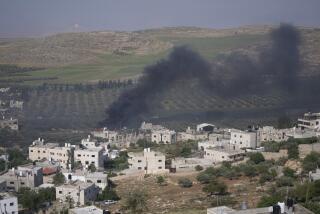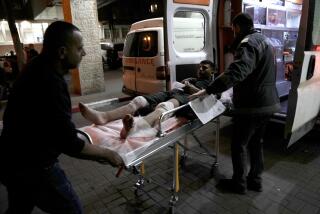Palestinians at funeral protest death of prisoner
SAIR, West Bank — As Israel looked for ways to contain growing Palestinian anger over the death of a West Bank detainee in its custody, thousands of mourners gathered Monday for the funeral of the man Palestinian officials say succumbed to torture by Israeli interrogators.
With impassioned crowds surpassing 7,000, the funeral of Arafat Jaradat in the village of Sair was one of the largest in years. The gathering remained largely peaceful except for some short-lived clashes between rock-throwing youths and Israeli soldiers near the highway to Hebron.
As the funeral procession carrying Jaradat’s body snaked through the hillside town, members of the Al Aqsa military brigade fired guns in the air and chanted anti-Israel slogans. A circle of schoolgirls held up hand-painted signs equating Nazi swastikas with Jewish Stars of David.
“The people are hungry for an intifada,” said Jihan Jaradat, 30, an attorney from Sair who is from the same extended family as Arafat. Echoing the sentiments of many on the streets, she said another uprising is needed to return international attention to the plight of Palestinian statehood and pressure Israel to end its occupation.
“Maybe an uprising will help our situation and move things politically on the ground,” she said, holding an infant daughter. “The world isn’t interested in Palestinians right now.”
Palestinian leaders say Jaradat’s death Saturday at Meggido prison and concerns about the health of four other prisoners on hunger strike are only the sparks that have ignited long-simmering Palestinian frustration over Israeli control over the West Bank, expansion of Jewish settlements and the lack of a peace process.
“This is an accumulation of so many injustices that are boiling up,’’ said Aziz Dweik, a Hamas-affiliated legislator in the West Bank. “People are angry and are saying enough is enough.”
Others expressed skepticism that the past week of protests and riots over the prisoner issue would spiral into a full-fledged uprising similar to ones launched in 1987 and 2000.
In his first public comments since Jaradat’s death, Palestinian Authority President Mahmoud Abbas vowed to maintain calm in the West Bank and accused Israel of trying to provoke Palestinians to violence. He accused Israeli soldiers of using live ammunition against unarmed protesters. A 13-year-old Palestinian from the Bethlehem area was injured Monday by Israeli gunfire, Palestinian hospital officials reported.
Abbas reiterated the authority’s demand for an inquiry into Jaradat’s death.
Palestinian officials say an autopsy showed Jaradat was tortured, with two broken ribs and bruises on his chest and back.
Israeli officials initially said it appeared Jaradat, a 30-year-old gas station attendant who was arrested on suspicion of throwing rocks at a settler, died of a heart attack. But final test results to determine the cause of death may not be ready for several days, they said.
Israel’s Health Ministry said the marks and injuries to Jaradat’s body came from attempts to resuscitate him.
Israeli officials have blamed Abbas and other Palestinian leaders for failing to tamp down the demonstrations, saying the authority is exploiting the street violence to put political pressure on Israel.
“The PA is apparently trying to walk a fine line,” said Maj. Gen. Amos Gilad, head of the Defense Ministry’s political security division, on Israel Radio. “The problem is that in this game, you never know when things will get out of control.”
Others in Israel blame Prime Minister Benjamin Netanyahu for failing to do more to calm the situation. Amid widespread speculation in the Israeli media that another intifada is imminent, left-wing lawmakers are demanding that he appear before the Knesset next week to answer questions about the situation.
Israel’s former National Security Council head Giora Eiland wrote Monday in the Yediot Aharonot newspaper that Netanyahu’s government exacerbated Palestinian anger late last year by pushing forward on a controversial settlement project outside of Jerusalem, failing to crack down on Jewish settlers who attack Palestinians and suspending tax transfers to the cash-strapped authority.
On Sunday, Israel said it would resume the payments, which the authority says it needs to pay delinquent salaries to government workers and security officers.
Outside the Jaradat home Monday, grieving family members said they were still searching for answers. “This was a war crime and there was no justification,” said Musa Jaradat, 45, a cousin.
He remembered Jaradat as a smiling, well-liked figure in Sair, known for chatting up drivers while pumping their gas. He had two small children and his widow is pregnant.
Musa Jaradat said his cousin had never been arrested before, but was a member of the Fatah Youth Movement and, according to Al Aqsa members who attended his funeral, part of the West Bank military brigade.
The Israeli human rights group B’Tselem said complaints by Palestinian prisoners of mistreatment by Israel’s Shin Bet domestic security agency are common, but rarely prosecuted. Between 2001 and 2011, 700 complaints were filed by prisoners, but none resulted in a criminal investigation, said Sarit Michaeli, the group’s spokeswoman.
Common complaints include sensory deprivation, sleep deprivation, solitary confinement in a foul-smelling cell, dim light designed to cause disorientation, and extreme cold.
“These are systematic practices that make up the norm,” she said. “It isn’t a coincidence, a malfunction or accident. It’s a system.”
ALSO:
Oscar for ‘Argo’ gets a thumbs-down in Iran
Kerry, on inaugural trip as chief diplomat, urges Syria solution
British cardinal resigns after charges of ‘inappropriate behavior’
News assistant Batsheva Sobelman in The Times’ Jerusalem bureau contributed to this report.
More to Read
Start your day right
Sign up for Essential California for news, features and recommendations from the L.A. Times and beyond in your inbox six days a week.
You may occasionally receive promotional content from the Los Angeles Times.






